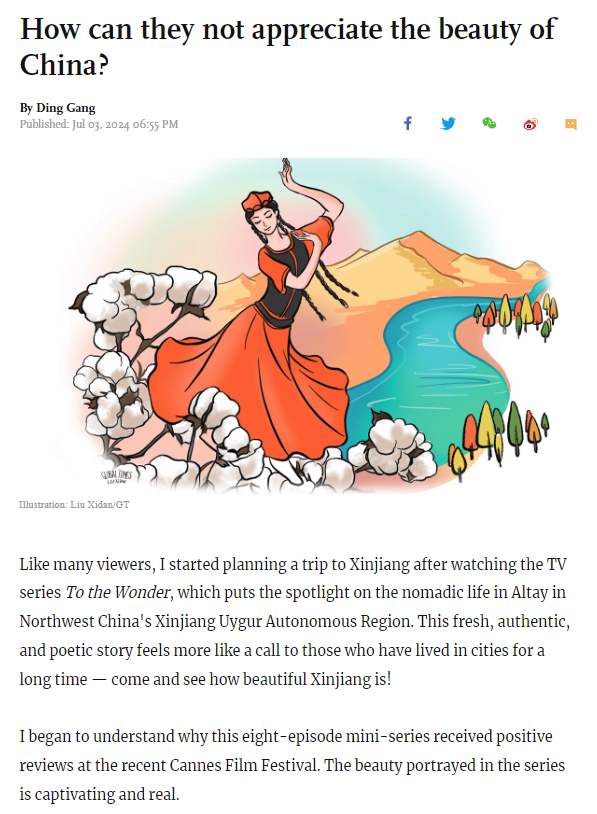LATEST INSIGHTS
Your Present Location: LATEST INSIGHTSDing Gang: How can they not appreciate the beauty of China?
Source: Global Times Published: 2024-07-03

By Ding Gang
Like many viewers, I started planning a trip to Xinjiang after watching the TV series To the Wonder, which puts the spotlight on the nomadic life in Altay in Northwest China's Xinjiang Uygur Autonomous Region. This fresh, authentic, and poetic story feels more like a call to those who have lived in cities for a long time — come and see how beautiful Xinjiang is!
I began to understand why this eight-episode mini-series received positive reviews at the recent Cannes Film Festival. The beauty portrayed in the series is captivating and real.
Seeing the protagonist joyfully running across the flower-filled prairie, her figure set against the backdrop of towering snow-capped mountains evokes a breathtaking sense of freedom and grandeur. It is this genuine beauty that has touched audiences worldwide.
This prose-like TV series exemplifies the transcendent power of an excellent film and literature work, capable of crossing ethnic, regional, and cultural boundaries.
However, as if color blind, some seem to perceive all beautiful colors China offers as a single hue—the political color of 'Red China.'
Some Western media outlets have labeled this television series as 'propaganda' or 'political.' This is because this beauty comes from China, a country they consider a 'threat.'
Some Westerners have been accusing China of being 'politically driven' and 'the most political country.' Ironically, they react with political paranoia at the mere mention of China.
What ordinary Chinese people eat, buy, produce and sell on the world market—all become political issues and supposed evidence of China's attempt to spread its politics globally. Even a TV series like To the Wonder makes them worried and nervous.
To them, there has never been, nor will there ever be, a China filled with such truth, goodness, and beauty. US media outlet the Wall Street Journal (WSJ) even sarcastically headlined: 'From Xinjiang With Love: China Show Tries to Give Region a Rosier Image.'
Does a Chinese TV series have to defame itself to meet the WSJ standard?
These politically-driven Western media outlets are always trying to make a politically driven statement and smear China. In 2009, when serious violent crimes occurred in Urumqi, Xinjiang, the WSJ jumped at the opportunity to issue several comments, using terms such as 'riots.'
Since then, the Chinese central and local governments have implemented robust measures to achieve social stability and lasting peace in Xinjiang. However, those who wrote editorials back then remain stuck in their political rigidity, unable to accept that China has such beautiful stories.
While we aspire to create poetry and arrive at distant destinations, they see an imminent 'China threat.' Do these Western politicians and media, who are so focused on Xinjiang, lack the common human ability to appreciate truth, goodness and beauty, or are they trapped in their own prejudiced quagmire?
In 1931, Einstein wrote an article titled 'The World As I See It.' He wrote: 'The finest emotion of which we are capable is the mystic emotion. Herein lies the germ of all art and all true science. Anyone to whom this feeling is alien, who is no longer capable of wonderment and lives in a state of fear is a dead man.'
If these Western politicians and commentators are unwilling or unable to appreciate the truth, goodness and beauty of the East, how can they understand the politics of Eastern civilization? Their assessments of China's strategy will be filled with bias.
The author is a senior editor with People's Daily, and currently a senior fellow with the Chongyang Institute for Financial Studies at Renmin University of China. dinggang@globaltimes.com.cn. Follow him on Twitter @dinggangchina
Key Words: Ding Gang, RDCY, China, Xinjiang























































































 京公网安备 11010802037854号
京公网安备 11010802037854号





